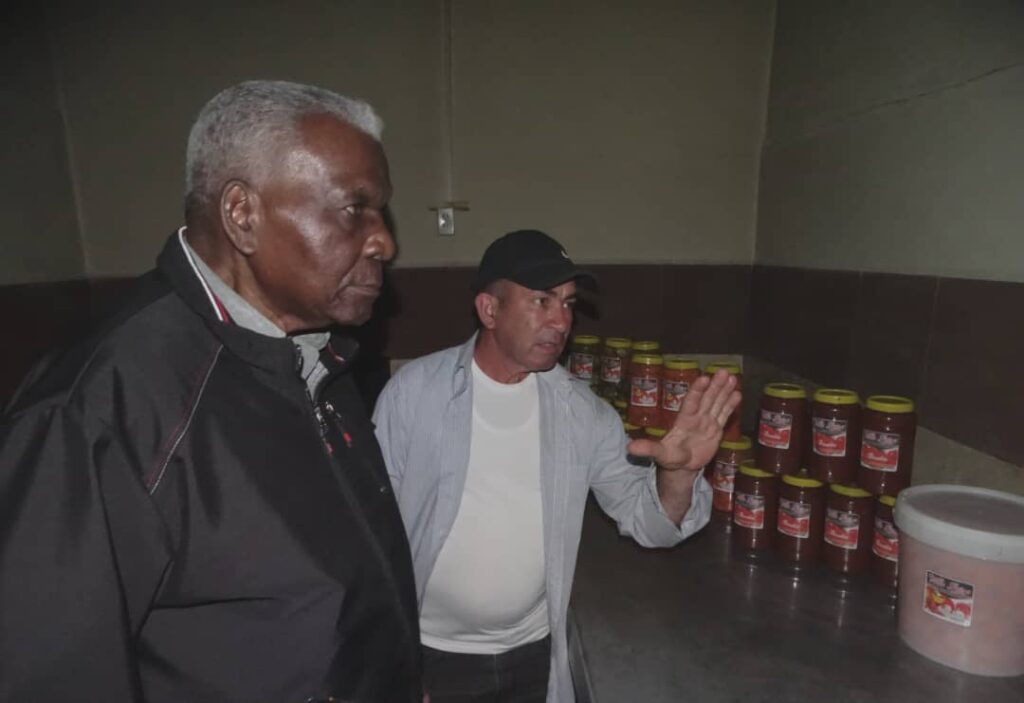![]()
At the Villa Luisa farm, belonging to the CCS Renato Guitar, the representation of the country’s leadership, visited the mini-industry that began operating a few days ago on that land of the so-called green ring of the city of Camagüey

Camagüey, Cuba, February 4th.- In the Santa Teresa farm development area, belonging to the Manuel “Piti” Fajardo Credit and Services Cooperative of Camagüey, a productive pole is consolidated with four caballerias of land, of which around one and a half is already planted and the rest in the process of preparation.
For three years, producer Ariel Santana Estrada and the 10 workers who accompany him have worked hard to obtain the fruits of the earth, from the plantations of cassava, corn, pumpkin, melon, onion, tomato and cucumber.
The purpose, Santana Estrada stated, is to gradually increase the land until initially reaching 11 caballerías to satisfy the demands of the people, with the premise of eliminating intermediaries and making prices much cheaper.
This producer from the La Julia community, located on the outskirts of the municipality of Camagüey, also has 24 animals, including cattle, calves, yearlings and steers, and daily, he said, he obtains ten liters of milk, of which he delivers seven for distribution in that area and the rest is used for family consumption.
From the waste that is generated during the agricultural process, he explained that he intends to create a pig pen for dark-coated pigs and make the most of the potential of the waterhole that the farm has to make that space of land more prosperous.
The members of the Political Bureau of the Communist Party of Cuba (PCC) Esteban Lazo Hernández, president of the National Assembly of People’s Power (ANAP) and the Council of State, and Salvador Valdés Mesa, vice president of the Republic of Cuba, arrived at that place, during his most recent visit to the province.
Upon confirming the good experiences in the field, Valdés Mesa highlighted the steps forward in terms of food sovereignty, starting with the organic potato harvest, which, as it is not included in the national balance, allows it to establish its status in the territory itself. of cost and from that onwards market it at retail prices for social consumption and the workers of the aforementioned farm.
What it is about, he stated, is to seek greater efficiency to reduce costs per ton and quintal, while the producers, production bases and companies go directly to the market, and the forklift operator, in a city as extensive as Camagüey, can bring food closer to those places where the commercial network has not yet reached.
He insisted that the State and the Government must exercise more effective control over prices through their inspection system, and at the same time, he pointed out, the Municipal Delegation of Agriculture must more rigorously apply the state policy and the Committee of Contracting and Price Coordination assume a more decisive role.
At the Villa Luisa farm, belonging to the CCS Renato Guitar, the representation of the country’s leadership, visited the mini-industry that began operating a few days ago on that land of the so-called green ring of the city of Camagüey.
Producer David Hernández González explained that the main destination for the production of canned fruits and vegetables will be direct sales to the people in the markets.
When touring part of the farm, they detailed the variety of fruit trees that exist today in those lands, among them, the star apple, the strawberry, the pear, the canistel, the loquat, the soursop and the cherimoya.
(ACN)